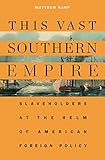This Vast Southern Empire : Slaveholders at the Helm of American Foreign Policy / Matthew Karp.
Material type: TextPublisher: Cambridge, MA : Harvard University Press, [2017]Copyright date: ©2016Description: 1 online resource (350 p.) : 7 halftones, 3 maps, 3 tablesContent type:
TextPublisher: Cambridge, MA : Harvard University Press, [2017]Copyright date: ©2016Description: 1 online resource (350 p.) : 7 halftones, 3 maps, 3 tablesContent type: - 9780674973817
- 306.3/62097309033 23
- E183.7 .K345 2016eb
- online - DeGruyter
| Item type | Current library | Call number | URL | Status | Notes | Barcode | |
|---|---|---|---|---|---|---|---|
 eBook
eBook
|
Biblioteca "Angelicum" Pont. Univ. S.Tommaso d'Aquino Nuvola online | online - DeGruyter (Browse shelf(Opens below)) | Online access | Not for loan (Accesso limitato) | Accesso per gli utenti autorizzati / Access for authorized users | (dgr)9780674973817 |
Frontmatter -- Contents -- Introduction: The World the Slaveholders Craved -- 1. Confronting the Great Apostle of Emancipation -- 2. The Strongest Naval Power on Earth -- 3. A Hemispheric Defense of Slavery -- 4. Slavery’s Dominoes: Brazil and Texas -- 5. The Young Hercules of America -- 6. King Cotton, Emperor Slavery -- 7. Slaveholding Visions of Modernity -- 8. Foreign Policy amid Domestic Crisis -- 9. The Military South -- 10. American Slavery, Global Power -- Epilogue: The Rod of Empire -- Notes -- Acknowledgments -- Credits -- Index
restricted access online access with authorization star
http://purl.org/coar/access_right/c_16ec
When the United States emerged as a world power in the years before the Civil War, the men who presided over the nation’s triumphant territorial and economic expansion were largely southern slaveholders. As presidents, cabinet officers, and diplomats, slaveholding leaders controlled the main levers of foreign policy inside an increasingly powerful American state. This Vast Southern Empire explores the international vision and strategic operations of these southerners at the commanding heights of American politics. For proslavery leaders like John C. Calhoun and Jefferson Davis, the nineteenth-century world was torn between two hostile forces: a rising movement against bondage, and an Atlantic plantation system that was larger and more productive than ever before. In this great struggle, southern statesmen saw the United States as slavery’s most powerful champion. Overcoming traditional qualms about a strong central government, slaveholding leaders harnessed the power of the state to defend slavery abroad. During the antebellum years, they worked energetically to modernize the U.S. military, while steering American diplomacy to protect slavery in Brazil, Cuba, and the Republic of Texas. As Matthew Karp demonstrates, these leaders were nationalists, not separatists. Their “vast southern empire” was not an independent South but the entire United States, and only the election of Abraham Lincoln broke their grip on national power. Fortified by years at the helm of U.S. foreign affairs, slaveholding elites formed their own Confederacy—not only as a desperate effort to preserve their property but as a confident bid to shape the future of the Atlantic world.
Mode of access: Internet via World Wide Web.
In English.
Description based on online resource; title from PDF title page (publisher's Web site, viewed 24. Aug 2021)


